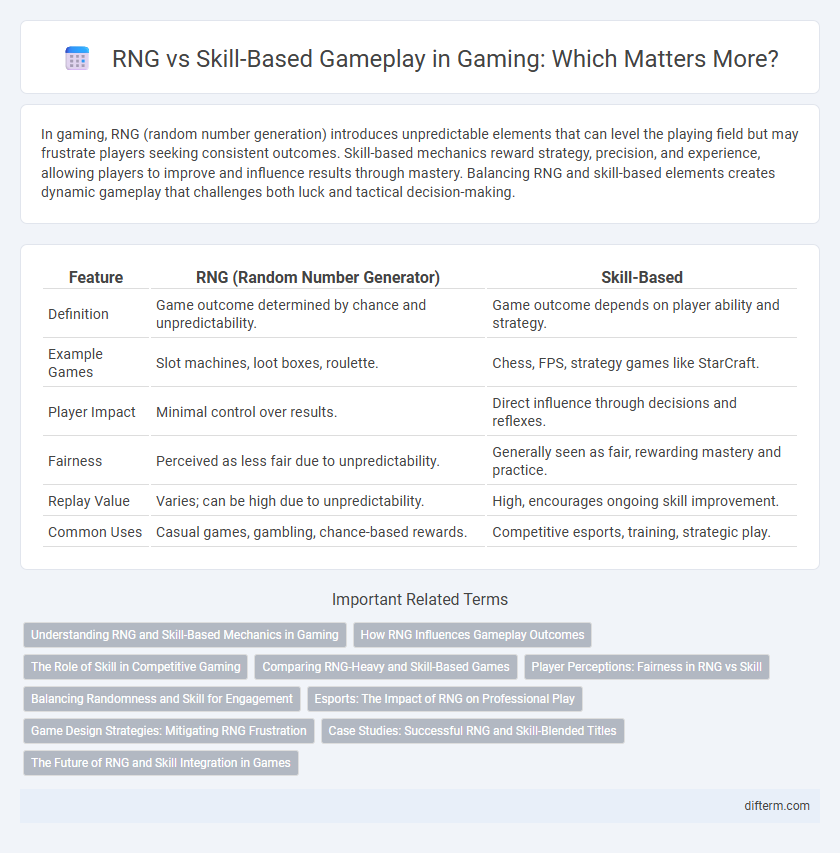In gaming, RNG (random number generation) introduces unpredictable elements that can level the playing field but may frustrate players seeking consistent outcomes. Skill-based mechanics reward strategy, precision, and experience, allowing players to improve and influence results through mastery. Balancing RNG and skill-based elements creates dynamic gameplay that challenges both luck and tactical decision-making.
Table of Comparison
| Feature | RNG (Random Number Generator) | Skill-Based |
|---|---|---|
| Definition | Game outcome determined by chance and unpredictability. | Game outcome depends on player ability and strategy. |
| Example Games | Slot machines, loot boxes, roulette. | Chess, FPS, strategy games like StarCraft. |
| Player Impact | Minimal control over results. | Direct influence through decisions and reflexes. |
| Fairness | Perceived as less fair due to unpredictability. | Generally seen as fair, rewarding mastery and practice. |
| Replay Value | Varies; can be high due to unpredictability. | High, encourages ongoing skill improvement. |
| Common Uses | Casual games, gambling, chance-based rewards. | Competitive esports, training, strategic play. |
Understanding RNG and Skill-Based Mechanics in Gaming
Random Number Generation (RNG) introduces unpredictability to gaming outcomes by using algorithmic randomness, creating variables that can affect loot drops, enemy behavior, or event triggers. Skill-based mechanics reward player expertise, precision, and strategic decision-making, relying on mastery of game rules and controls to achieve success. Balancing RNG with skill ensures fair challenge and engagement, as randomness adds excitement while skill guarantees consistent player agency.
How RNG Influences Gameplay Outcomes
Random Number Generation (RNG) introduces unpredictability in gaming outcomes, affecting critical elements like loot drops, damage calculations, and event triggers. This randomness can level the playing field by giving less skilled players occasional advantages, but it also challenges skill-based strategies by adding an element of chance that must be managed. Understanding RNG mechanics allows players to optimize decision-making, balancing risk and reward to improve overall performance in both competitive and casual gaming environments.
The Role of Skill in Competitive Gaming
Skill remains the primary determinant of success in competitive gaming, as players develop strategies, reflexes, and decision-making abilities to outperform opponents. While RNG (random number generation) elements introduce variability, top-tier players consistently adapt and mitigate luck through experience and precise execution. This balance ensures that skillful gameplay drives competitive outcomes rather than chance.
Comparing RNG-Heavy and Skill-Based Games
RNG-heavy games rely on random number generation to determine outcomes, creating unpredictability that appeals to casual players seeking variety and excitement. Skill-based games emphasize player expertise, reflexes, and strategy, rewarding consistent practice and mastery with predictable performance improvements. Comparing both, RNG-heavy games offer accessibility and luck-driven thrills, while skill-based games provide depth, competitive fairness, and long-term engagement.
Player Perceptions: Fairness in RNG vs Skill
Players' perceptions of fairness in gaming often hinge on the balance between RNG and skill-based elements, with many viewing skill-based outcomes as a more genuine test of ability. RNG introduces unpredictability that can level the playing field, but excessive reliance on randomness may frustrate players who prefer strategic mastery. Fairness is commonly associated with perceived control, making skill-dependent mechanics more favorable among competitive gamers seeking consistent, merit-driven results.
Balancing Randomness and Skill for Engagement
Balancing randomness and skill in gaming is crucial for maintaining player engagement and satisfaction. Integrating RNG elements with skill-based mechanics ensures unpredictability without undermining player mastery, fostering competitive fairness and replayability. Optimal game design calibrates RNG frequency and impact to enhance excitement while rewarding strategic decision-making.
Esports: The Impact of RNG on Professional Play
RNG (Random Number Generation) introduces unpredictability that can disrupt consistency in esports, challenging players to adapt strategies dynamically. Skill remains paramount, as top competitors leverage game knowledge and mechanics to mitigate RNG effects and maintain a competitive edge. Balancing RNG elements ensures esports titles remain engaging while preserving fairness and rewarding player expertise.
Game Design Strategies: Mitigating RNG Frustration
Game design strategies focus on balancing RNG elements with skill-based mechanics to reduce player frustration and enhance engagement. Implementing predictable RNG patterns, providing player agency through decision-making, and offering skill-dependent rewards create a fair gameplay experience. Incorporating adaptive difficulty and transparent RNG outcomes further mitigates randomness impact, fostering player satisfaction in competitive and casual gaming environments.
Case Studies: Successful RNG and Skill-Blended Titles
Successful gaming titles like "Fortnite" and "Hearthstone" demonstrate the effective blend of RNG and skill, where strategic decision-making intertwines with randomized elements to maintain player engagement. Case studies reveal that "Slay the Spire" uses RNG to vary encounters and card draws, enhancing replayability while rewarding skillful deck-building and tactical play. This synergy between chance and skill creates dynamic gameplay experiences that appeal to a broad audience and sustain long-term interest.
The Future of RNG and Skill Integration in Games
The future of RNG and skill integration in games lies in striking a balanced synergy where random elements enhance unpredictability without undermining player expertise. Developers increasingly adopt hybrid mechanics that reward strategic decision-making while incorporating RNG to maintain dynamic, replayable experiences. This evolving design approach ensures competitive fairness and sustained player engagement across various gaming genres.
RNG vs skill-based Infographic

 difterm.com
difterm.com